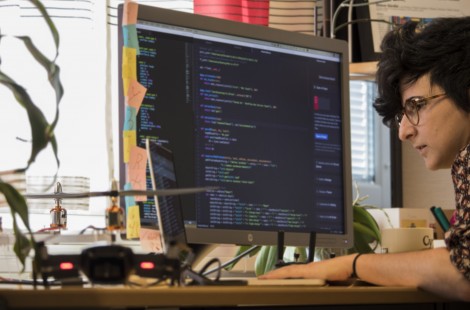
When I was very young in primary school, I remember seeing a magazine that listed the top jobs of the millennium. It was a splendid read for me. One of them was especially interesting because it was called a 'computer scientist' and I knew from my commodore 64 computer how exciting that was. Now that I am thinking about it, I don't know how I was able to spend hours with that computer; it did not really do a lot.
Studying computer science was one of the best things that happened to me. I learned a lot about programming languages, fundamentals about computer architectures and microprocessors, algorithms and more. I think it is a unique feeling to love what you do. I knew very well that I liked programming and software development, but I was in love with computer architectures and hardware. For that reason, I chose to do my Master's degree to understand the arithmetic logic unit of microprocessors and focused on developing low power multiplier topologies for saving energy. The programme was about sustainable environment and energy systems, and having a multidisciplinary learning environment amazed me really. I had lectures from political science, environmental science, electrics and electronics, and mathematics. At that point, I was sure that I would never go back to be a uni-disciplinary person. Yet it took me another four years of doctoral education to understand how much we need a transdisciplinary skillset to deal with the problems of our century.
I am a computer scientist, who cares about the future of the world and aims to do all I can to make the world sustainable. Having a PhD degree in mechatronics, I had the chance to work with different types of cyber-physical systems such as collaborative robots, smart infrastructure and cities, and autonomous vehicles. We call these systems complex, intelligent and autonomous systems. I like wearing different hats and I want all to be able to do that, because this is the only way to deal with the hyper-complex world problems that we face. Climate change, water scarcity, air pollution, forced migrations, poverty, gender gap, environmental crises, deforestation, destruction of the social fabric and many more are not problems that only one discipline can find a solution to. There is surely a need for different disciplines to collaborate in crossdisciplinary environments. But we also need people who are transdisciplinary. People who are engineers but have a good understanding of behavioural sciences; data scientists who can study ethical, moral dilemmas; neuroscientists who are data fluent; engineers who do not only solve technical problems but innovate; mathematicians who are critical, and so on.
I find this new world full of challenges and we need to answer very exciting questions. What will the future look like for us? What will the transportation systems look like? How are we going to work with robots? How are going to deal with data and artificial intelligence? How will the next generations live, work, learn? How can we make that world a better, equal, more diverse place than today’s world? To answer these questions, we need you - young women who have a future perspective, who are creative and brave, who care about the world and believe that they can change it. And we need you to be transdisciplinary!
Whatever you choose to do, at first do something that excites you. Then, extend your knowledge to more than one discipline and do it again. I believe this is how we will change the world to a better place.
Dr Didem Gurdur Broo
Postdoctoral Bye Fellow in Computer Science, Murray Edwards College